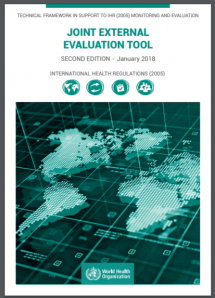Joint External Evaluation Tool
A joint external evaluation (JEE) is a voluntary, collaborative, multisectoral process to assess country capacities to prevent, detect and rapidly respond to public health risks whether occurring naturally or due to deliberate or accidental events. The JEE helps countries identify the most critical gaps within their human and animal health systems in order to prioritize opportunities for enhanced preparedness and response.
This tool contains a chapter on Risk Communication. The chapter outlines the specific capacities in risk communication that GHSA is looking to strengthen in terms of how it is defined, targets, how it is measured, and desired impact. Countries are evaluated on these capacities and receive a score. GHSA country programs are asked to demonstrate how we are building these specific risk communication capacities to increase the scores. Much of it is focused on systems for risk communication and goes beyond just communication with the public or engagement with communities.
Tools include plans, strategies, and mechanisms for coordination. I am not sure if it is necessary to factor any of this broader definition into your description, but we do probably do want to include it as a resource. JEE scores and capacities will likely come up as part of the discussion, particularly from USAIDs contributions.
Last modified: March 25, 2019
Language: English

